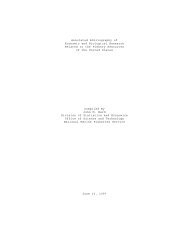NOAA Protocols for Fisheries Acoustics Surveys and Related ...
NOAA Protocols for Fisheries Acoustics Surveys and Related ...
NOAA Protocols for Fisheries Acoustics Surveys and Related ...
Create successful ePaper yourself
Turn your PDF publications into a flip-book with our unique Google optimized e-Paper software.
An electronic ‘event log’ can be developed based on the SCS system. The event log is a data<br />
management tool <strong>for</strong> relating echo sounder data with scientific operations. When operational,<br />
the event log is routinely completed throughout each cruise to document chronological events of<br />
the acoustic sampling, deployments, <strong>and</strong> other operational details that are important <strong>for</strong> data<br />
processing <strong>and</strong> management. The event log can be used to register the start <strong>and</strong> stop of transects,<br />
gear deployments, sites <strong>and</strong> transect series <strong>and</strong> associated data such as date-time stamps,<br />
geographic location, EK500 vessel logs, <strong>and</strong> comments during survey operations.<br />
Techniques<br />
Event Log<br />
SCS data<br />
Error<br />
Uncertainty in temperature <strong>and</strong> salinity affect sound speed calculations, which affect all<br />
acoustical measurements. Temperature <strong>and</strong> salinity sensors must be calibrated to ensure high<br />
quality oceanographic measurements.<br />
Errors in logging <strong>and</strong> recording events will reduce the accuracy of survey estimates because<br />
acoustical data will be improperly related to transects or deployments. While the in<strong>for</strong>mation is<br />
redundantly entered on a hard copy version of the event log, every ef<strong>for</strong>t must be insured to<br />
accurately enter in<strong>for</strong>mation in the electronic event log.<br />
Considerations<br />
Remediation<br />
If temperature <strong>and</strong> salinity measurements are found to be in error, corrections to the<br />
oceanographic data should be implemented <strong>and</strong> new sound speeds calculated. If a significant<br />
change in sound speed is found, acoustical data should be reanalyzed.<br />
If errors in the event logging software or SCS data are observed during the survey, contact<br />
the electronics technician on board to rectify the problem.<br />
Improvements<br />
Acoustical data are continuous in two dimensions (vertical <strong>and</strong> along the ship track). CTD<br />
profiles provide vertical measurements at a single point along the cruise track <strong>and</strong> surface<br />
sensors provide one-dimensional measurements along the cruise track. Interpolation <strong>and</strong><br />
extrapolation of these data are necessary to match the physical environment to the acoustical<br />
data. An improvement would be having the ability to collect two-dimensional temperature <strong>and</strong><br />
salinity measurements.<br />
Data Management<br />
Data, post-processed data, <strong>and</strong> associated meta-data should be routinely archived during the<br />
survey. These data are downloaded to shore-based computers <strong>and</strong> permanently archived <strong>for</strong> each<br />
survey. In addition to data, post-processing <strong>and</strong> other software should be archived.<br />
44
















